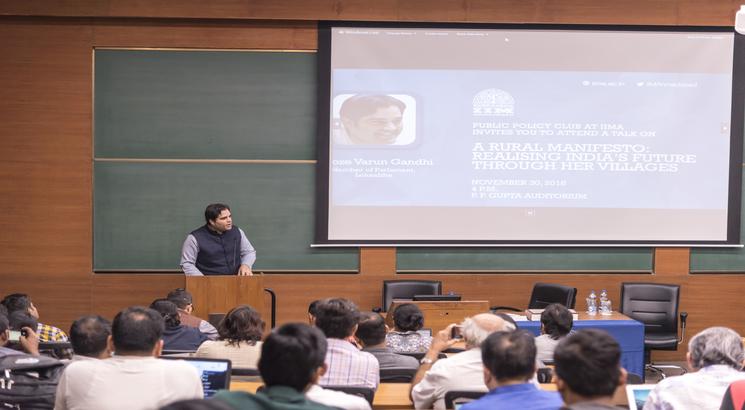Feroze Varun Gandhi, BJP leader and a Member of Parliament delivered a lecture at IIM Ahmedabad, at an event organised by the Public Policy Students Club of the Institute on Friday. The lecture was attended by around 100 people including students from the PGPM, Food and Agribusiness Management (FABM) and Armed Forces Programmes besides staff and some faculty members.
He also launched his book ‘A Rural Manifesto: Realising India’s Future Through her Villages’ at the session. Mr Gandhi talked about his 2.5 years of research for his book which he fondly calls as ‘the unreadably dense volume’.
He gave brief examples from his experiences, both urban and rural, to highlight the inequalities prevalent in the Indian society currently.
He discussed how ‘privilege perpetuates privilege’ and how technology has the potential to act as an equaliser, if used well.
He further talked about political reforms that would help strengthen India’s democratic governance, such as “parliamentary addressal of public petitions, need for addressing electoral corruption and strengthening the parliamentary discussion process on passing laws”.
Among other things, he also talked about basic innovations in the rural economy.
Supporting the MNREGA scheme of UPA regime, Gandhi said, “I support MNREGA as it has led to some good work especially in Rajasthan. But its failure is the payment timeline.”
He also lauded current government schemes like Ujjwala but pointed that it should be decentralized.
Calling for a national employment policy, he said, “As against 57000 patents filed by Americans, Indians file 1400 patents a year. The average time to get a patent in America is 6-7 months whereas in India, it is 5-6 years. By investing a lakh in textiles, we can create 24 jobs but by investing 24 lakhs in steel, we can only create one job. We need to choose a path of creating jobs. Long ago, 40% of India’s GDP was textile which now is only 2%.”
“The talk was highly insightful and displayed various facets of the problem in the agriculture sector in India. Encompassing a mix of academic as well as practical knowledge, Mr Gandhi focused on the growing inequality in the country leading to an increase in inequity in the society as well,” said second year PGP student and coordinator of the Public Policy Club, Aditya Govil.

